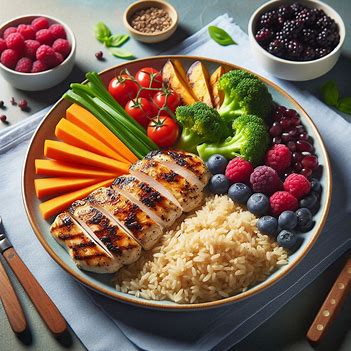Meal Plans
A 2,000-calorie diet is a standard for maintaining weight in adults

A 2,000-calorie diet is a standard for maintaining weight in adults, though individual needs can vary based on factors like age, activity level, and metabolism. This calorie level can be used for weight maintenance, and in some cases, for gradual weight loss. The key is to focus on nutrient-dense foods from a variety of food groups to ensure you’re getting enough vitamins, minerals, fiber, and protein.
Here’s what a balanced 2,000-calorie diet might look like over a day, along with some tips for healthy choices.
General Guidelines for a 2,000-Calorie Diet
To create a healthy, balanced 2,000-calorie diet, aim to include:
- Vegetables: 2.5–3 cups per day
- Fruits: 2 cups per day
- Grains: 6 ounces per day (with at least half being whole grains)
- Protein: 5–6 ounces per day (from sources like lean meats, poultry, fish, tofu, beans, and nuts)
- Dairy: 3 cups per day (preferably low-fat or non-fat options)
- Fats/Oils: Around 27 grams per day (focus on healthy fats from sources like olive oil, avocado, and nuts)
Sample 2,000-Calorie Meal Plan
Breakfast (400–500 calories)
- 1 slice whole grain toast (80 calories)
- 1 tablespoon natural peanut butter (90 calories)
- 2 scrambled eggs (140 calories)
- 1/2 cup berries (blueberries or strawberries) (40 calories)
- 1 cup low-fat milk or almond milk (100 calories)
Total: ~450 calories
This breakfast offers a balance of healthy fats, protein, fiber, and vitamins. Whole grain toast provides complex carbs, while eggs and peanut butter supply protein and healthy fats.
Morning Snack (150–200 calories)
- 1 small apple (80 calories)
- 1 ounce almonds (about 23 almonds) (160 calories)
Total: ~240 calories
Almonds add protein, healthy fats, and fiber, making this a filling snack. The apple offers fiber and important vitamins like vitamin C.
Lunch (500–600 calories)
- Grilled chicken salad:
- 3–4 oz grilled chicken breast (120–140 calories)
- 2 cups mixed greens (10 calories)
- 1/4 cup quinoa (56 calories)
- 1/4 avocado (60 calories)
- 1 tablespoon olive oil (120 calories)
- 1 tablespoon balsamic vinegar (15 calories)
- 1 tablespoon sunflower seeds (50 calories)
Total: ~500 calories
This meal is rich in lean protein, healthy fats, and fiber. The quinoa adds complex carbs, while the greens and avocado supply essential vitamins and minerals.
Afternoon Snack (150–200 calories)
- 1/2 cup hummus (120 calories)
- 1 cup raw veggies (carrot sticks, cucumber, bell peppers) (50 calories)
Total: ~170 calories
Hummus is a great source of plant-based protein and healthy fats, while the veggies add fiber and vitamins.
Dinner (600–700 calories)
- 4 oz grilled salmon (200 calories)
- 1 cup cooked quinoa or brown rice (220 calories)
- 1 cup steamed broccoli (55 calories)
- 1 tablespoon olive oil (used for cooking) (120 calories)
- 1 small mixed greens salad with 1 tablespoon olive oil and vinegar (150 calories)
Total: ~645 calories
Salmon provides healthy omega-3 fats and high-quality protein. Quinoa or brown rice adds complex carbohydrates, and the vegetables are packed with fiber, vitamins, and minerals.
Dessert or Evening Snack (100–150 calories)
- 1 small piece of dark chocolate (70% cacao) (100 calories)
- 1/2 cup plain Greek yogurt with a drizzle of honey (50 calories)
Total: ~150 calories
A small serving of dark chocolate provides antioxidants, and Greek yogurt adds a dose of protein and probiotics for gut health.
Daily Totals:
- Calories: ~2,000
- Protein: ~100–120 grams
- Carbohydrates: ~200–250 grams
- Fats: ~60–70 grams
- Fiber: ~25–30 grams
Healthy Eating Tips for a 2,000-Calorie Diet
- Focus on Whole Foods: Prioritize whole grains, lean proteins, fruits, vegetables, and healthy fats over processed and refined foods.
- Watch Your Portions: Even with healthy foods, it’s important to manage portion sizes to avoid overeating.
- Hydrate: Drink plenty of water throughout the day. Herbal teas and sparkling water are also good options for hydration.
- Limit Added Sugars: Minimize foods and drinks with added sugars, such as sodas, candies, and sweetened snacks.
- Balance Macronutrients: Ensure your meals have a balance of protein, fat, and carbohydrates to keep you full and energized.
- Include Fiber: Aim to eat a variety of fiber-rich foods like fruits, vegetables, whole grains, and legumes to promote digestive health and satiety.
Conclusion
A 2,000-calorie diet can provide the energy and nutrients needed for most adults to maintain a healthy weight. The key is to balance meals and snacks throughout the day with nutrient-dense foods, ensuring you’re meeting your needs for protein, healthy fats, fiber, and essential vitamins and minerals. By focusing on whole, minimally processed foods, you can promote long-term health while enjoying satisfying and flavorful meals.
Would you like help with a specific dietary approach, such as vegetarian or Mediterranean within a 2,000-calorie plan?
Hello,
Do you struggle to carve out time for writing articles?
Hire an Experienced SEO Writer Today!
I do all the research and provide well-written SEO articles to help boost your rankings and better visitor engagement.
If you need fresh articles for your blog or content marketing strategies, see our current content deals here:
https://writingbybenjamin.com/
Benjamin
Contact me directly at behinger@writingbybenjamin.com or on Skype: behinger19 with any questions.
If you don’t want to get an email from me on this matter again, please rely back with the text: “No, thank you”